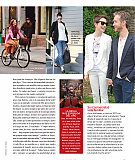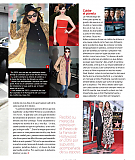Jonathan Demme has been making films — some of the smartest and funkiest in modern cinema — for 35 years now. He has navigated a circuitous path through celebratory slice-of-life drama such as Melvin and Howard, the screwball thrillers Something Wild and Married to the Mob, concert movies such as Stop Making Sense, the prestigious Oscar-winners The Silence of the Lambs and Philadelphia, and documentaries. If his next project is a western or something in 3-D, he’ll have the full house.
Has all this experience resulted in a magic formula? When we meet in a hotel suite high above the drizzly London streets, I ask Demme if he would like to add anything to his declaration, in the late 1980s, that the secret to making a decent movie is: “You get a good script, good actors, and try not to screw it up.” He lets out a joyful laugh — the first of many from this genial 64-year-old with short, bristly grey hair and a dusting of stubble — and gives an exaggerated slap of the thigh. “That’s the formula, baby!” he whoops.On the strength of Rachel Getting Married, his wise and winning new film, nobody could say it’s not working a treat. Anne Hathaway plays Kym, a Corpse Bride lookalike who returns from rehab to the luxurious family home in Connecticut for the wedding of her sister Rachel. The scenario suggests the Christmas special of any soap opera you’d care to name, which only makes its success and poignancy all the more miraculous. “It starts out right on track,” Demme agrees. “Bad sister gets out of rehab in time to ruin good sister’s wedding. Then it goes off on this whole other arc. Hopefully, we don’t deliver what you’d expect.”
A large part of the picture’s uniqueness can be attributed to its visual style. Demme says his intention was to make Rachel Getting Married, with its handheld camera, on-screen musical turns and raggedy editing, resemble “the most beautiful home movie ever made”. The actors were surprised to be given freedom from the tyranny of hitting marks — they could wander where they wanted, and the cinematographer (Declan Quinn) would follow. The loose vibe even extended to putting camcorders in the hands of the extras playing wedding guests, then drawing on their material during editing. (Roger Corman, the B-movie maestro who gave Demme his big break on the 1974 women-in-prison trash classic Caged Heat, is one of these extras.)
“I warned the actors, ‘Know this: from the moment you arrive at the house in costume, you’re fair game. So be prepared to be filmed at any time.’ Of course, the flip side is that you have to be prepared not to be filmed, even when you’re doing some of your best work, because the camera will in all likelihood be on someone else.” With one exception — an almost transcendental moment in which Kym wanders into her childhood bedroom and gazes down onto a vision of the past in the garden below — not one of the shots was planned in advance. “Even Declan didn’t really know until the action started, and he followed his muse. It’s a great discipline for actors to be on full all the time.”
One big surprise is the return to the screen of the long absent Debra Winger, in the small but pivotal role of Kym and Rachel’s viper-like mother, Abby (a part intended for Meryl Streep, until she asked Demme if she could be excused to make some obscure picture called Mamma Mia!). “I was intimidated about contacting Debra,” he confesses. “But my belief that we needed her transcended my fear of Debra Winger.” He makes it sound like a recognised medical condition. “I told her we wouldn’t discuss the character on set, we were only gonna shoot, shoot, shoot. She reluctantly accepted those ground rules and also, I think, had a blast. She might have killed me if I’d tried something like that 20 years ago!”
Also attending the fictional nuptials were many of the displaced citizens Demme met while making Right to Return, his documentary about post-Katrina New Orleans. “We decided that Rachel’s in-laws were from New Orleans,” he explains. “Most of the people playing them really are living in trailers at the moment; like a lot of New Orleanians, they’re natural talents, so I knew they’d resonate on screen.”
Demme also introduced into the action a soldier on leave from Iraq. “He’s a real soldier I’m acquainted with,” he explains. “I cast him because we were making the film in a world that’s in a horrendous state, and the country that hosts this wedding is responsible for so much. I felt if we had a soldier, it would bring a reminder of the world at large into the celebrations.”
This is Demme to a T: his liberal conscience informs every decision he makes, no matter how apparently insignificant. “You have to remember,” he once told me, “that the behaviour you visualise on screen will ultimately say something about us as a species.” Yet when we last met, four years ago, Demme seemed to have reached a minor crisis point. Although he had come to London to promote his latest, The Manchurian Candidate, his most lavish enthusiasm was reserved for another director’s film — Napoleon Dynamite, a no-budget comedy he had recently seen and loved. “I hope the next thing I do will be more adventurous, less calculated to reach a wider audience,” he had sighed.
Is Rachel Getting Married that film? “Were it not for Napoleon Dynamite…” Demme says wistfully. “Yes, I think that was specifically motivational for me. It was the biggest slap-in-the-face challenge a film-maker who’s used to bloated budgets could have. It was like, ‘Do you dare, do you have it in you, could you make an original film?’ I felt myself at a crossroads. For better or worse, Rachel Getting Married is me having the fabulous opportunity to do something different.”
I wonder if the phenomenal success of The Silence of the Lambs, which scooped five Oscars, including one for Demme, is an albatross for so humble a director. “No,” he decides, “but there is some seductive upward spiral, which I might have got sucked into, where once you have success, you get to make even more expensive films, you get paid more and your work seems even more ‘important’ and ‘major’.” He says those last words with a sneer, as if it pains him even to utter them.
Rachel Getting Married has attracted plenty of awards-season attention and nominations — especially for Hathaway’s courageously raw performance — but Demme is unfazed. “It goes straight into the box marked ‘They Like It’, and that’s lovely. But it really is all about the work” — he actually sings those words — “and we didn’t do it to win prizes. We did it because there are these strange demons that make us work, and when we work, we try to do the best we can.”
Source: Times Online





































